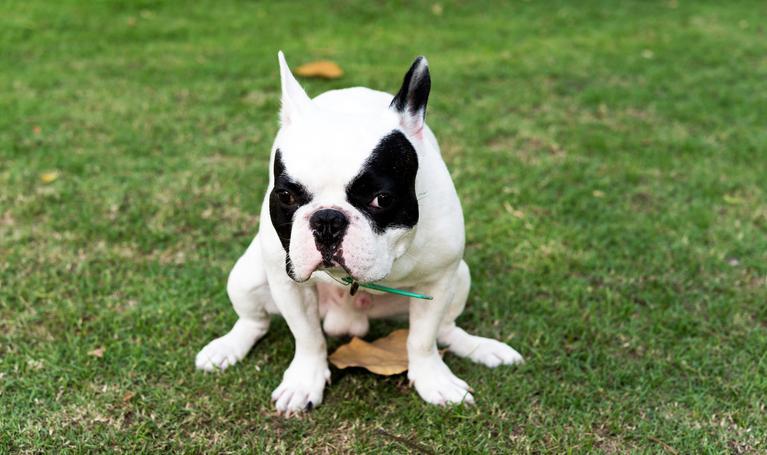French Bulldogs are beloved for their quirky personalities and adorable looks, but they can be prone to certain health issues, including digestive problems like diarrhea. As a responsible pet owner, it’s crucial to understand why your Frenchie might experience diarrhea, how to address it effectively, and what steps you can take to prevent it from recurring.
This comprehensive guide will delve into French Bulldog diarrhea, covering everything from common causes and treatment options to actionable prevention strategies. Let’s equip you with the knowledge you need to keep your furry friend healthy and comfortable.
Why French Bulldogs Are Prone to Diarrhea
1. Sensitive Digestive Systems
French Bulldogs have relatively delicate stomachs, making them more susceptible to gastrointestinal disturbances from dietary changes or irritants.
2. Allergies and Intolerances
This breed is known for being prone to food allergies or sensitivities, which can lead to diarrhea. Common culprits include grains, dairy, and certain proteins.
3. Brachycephalic Traits
Their unique anatomy can affect digestion, leading to issues like bloating or difficulty breaking down certain foods.
Common Causes of Diarrhea in French Bulldogs
1. Dietary Indiscretions
- Eating spoiled food, garbage, or something toxic can upset their stomach.
- Consuming rich or fatty table scraps is a frequent trigger.
2. Sudden Dietary Changes
Switching food brands or introducing new treats too quickly can disrupt their gut microbiome.
3. Food Allergies or Intolerances
Symptoms like diarrhea often signal an adverse reaction to specific ingredients in their diet.
4. Parasites
- Worms (roundworms, hookworms) and protozoa (like Giardia) can cause chronic or severe diarrhea.
- Regular deworming is essential for prevention.
5. Bacterial or Viral Infections
- Infections like salmonella or parvovirus can lead to acute diarrhea, often accompanied by vomiting or lethargy.
6. Stress or Anxiety
Changes in environment, routine, or exposure to new pets can lead to stress-induced diarrhea.
7. Medications
Antibiotics or other drugs can disrupt gut health, causing temporary diarrhea.
8. Underlying Health Conditions
- Pancreatitis, inflammatory bowel disease (IBD), or liver issues may present with diarrhea as a symptom.
Symptoms Accompanying Diarrhea in French Bulldogs
Be vigilant for the following signs that may accompany diarrhea:
- Lethargy
- Vomiting
- Fever
- Loss of appetite
- Dehydration
- Blood or mucus in stool
If these symptoms persist or worsen, consult a veterinarian immediately.
How to Treat Diarrhea in French Bulldogs
1. Monitor Hydration Levels
- Diarrhea can cause dehydration, which is dangerous for small breeds like French Bulldogs.
- Ensure your dog has constant access to fresh water.
2. Introduce a Bland Diet
Feed your Frenchie boiled chicken or turkey with plain rice or pumpkin until their stool normalizes.
3. Use Probiotics
Probiotics can help restore healthy gut bacteria. Choose a product formulated for dogs.
4. Over-the-Counter Medications
- Only under veterinary advice, you can use medications like kaolin-pectin or certain anti-diarrheal drugs.
- Avoid human medications like Imodium unless prescribed by your vet.
5. Rule Out Parasites
Schedule a fecal exam to check for parasitic infections.
When to See a Veterinarian
Seek immediate veterinary care if:
- Diarrhea persists for more than 24–48 hours.
- There’s blood, black tarry stool, or mucus in the stool.
- Your Frenchie shows signs of severe dehydration or lethargy.
- They refuse to eat or drink.
Preventing Diarrhea in French Bulldogs
1. Stick to a Consistent Diet
- Avoid sudden changes in food brands or types. Transition gradually over 7–10 days.
- Choose high-quality, grain-free, or hypoallergenic dog food.
2. Avoid Table Scraps
Limit exposure to fatty or rich human foods that can upset their stomach.
3. Keep an Eye on What They Eat
- Prevent access to garbage, toxic plants, or small objects that could be ingested.
- Supervise them during walks to avoid eating unknown items.
4. Maintain a Deworming and Vaccination Schedule
Regular deworming and vaccinations protect against parasites and infections.
5. Minimize Stress
Create a stable, predictable environment for your French Bulldog.
6. Provide Probiotics Regularly
Probiotics can support their gut health and immunity.
Home Remedies for Mild Cases
- Pumpkin Puree: Plain canned pumpkin can help firm up loose stools.
- Boiled Rice Water: Acts as a gentle binder for their stomach.
- Bone Broth: Helps rehydrate and provide nutrients without irritating the stomach.
Frequently Asked Questions
1. How long does diarrhea last in French Bulldogs?
Mild cases may resolve in 1–2 days. Persistent diarrhea lasting over 48 hours requires a vet’s attention.
2. Can I prevent diarrhea altogether?
While not entirely preventable, consistent diets, regular deworming, and a healthy environment reduce the likelihood of diarrhea.
3. Is it normal for diarrhea to recur?
Recurring diarrhea could signal underlying issues like allergies, IBD, or parasites. Consult a vet for further testing.
4. What should I do if my French Bulldog refuses to eat?
Try offering a bland diet. If they refuse food for over 24 hours or seem lethargic, seek veterinary care immediately.
5. Can stress cause diarrhea in French Bulldogs?
Yes, stress from new environments, separation anxiety, or routine changes can lead to diarrhea.
Fun Facts About French Bulldogs and Their Tummies
- French Bulldogs are notorious for their love of food—sometimes eating things they shouldn’t!
- Despite their sensitive stomachs, they’re highly food-motivated, making them easy to train with the right treats.
- Frenchies can be picky eaters when recovering from stomach upsets, so offering bland, easily digestible meals can be key.
Conclusion
Diarrhea in French Bulldogs can be alarming but is often manageable with the right care and preventive measures. By understanding the causes, recognizing the symptoms, and implementing effective treatments, you can help your Frenchie recover quickly and minimize future episodes.
Equipped with this guide, you’re ready to take charge of your French Bulldog’s health and ensure they live a happy, comfortable life free from digestive woes.

